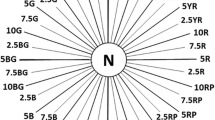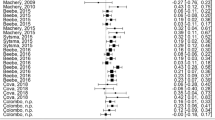Abstract
In a recent article in this journal, J. P. Moreland (2013) extends his theory of individuation to include universals. In this note, I show how Moreland’s novel proposal leads to the unwanted conclusion that every concrete particular exists of necessity and has but a single essential property.
Similar content being viewed by others
Notes
The contemporary debate here originates with Moreland’s robust defense of bare particulars (1998, 2001), which is endorsed to varying degrees by Oaklander and Rothstein (2000), Ten Elshof (2000), Preston (2005), Sider (2006), and Gould (2013). Criticisms of bare particular theory may be found in Mertz (2001, 2003), Davis (2003, 2004), Davis and Brown (2008), Loux (2006), Morganti (2011), Giberman (2013), and Bailey (2012). For replies to some of these criticisms, see Moreland and Pickavance (2003) and Pickavance (2009).
For the sake of convenience, I shall use the terms ‘property’ and ‘universal’ more or less interchangeably. Some philosophers make a sharp distinction between properties that are multiply exemplifiable (i.e., universals such as being human) and those that are not (e.g., being identical with Socrates). For example, see Plantinga (1974: 60–62). We should note that Moreland accepts only the former, which he classifies as pure properties—that is, universals that do not “incorporate” or “involve” a concrete particular. Thus being conscious and being corpulent are pure properties, while being married to Bill Clinton is not. The latter is an impure property, since it “incorporates” Bill Clinton in the following way: in every world in which an object has this property, it bears some relation or another to Bill Clinton. For a brief but helpful discussion, see Armstrong (1997: 91–93). For a sustained argument against impure properties, see Moreland (2001: 143–147).
Campbell eventually conceded this point: “To meet these disasters, let us abandon the view that a colour trope is individuated by its place” (1990: 68). Campbell now takes the individuation of tropes to be “basic and unanalyzable” (ibid.: 69).
Here it is important to distinguish metaphysical from epistemic individuation. In the epistemic sense, to individuate merely involves ‘singling out’ an object “as a distinct object of perception, thought, or linguistic reference” (Lowe 2003: 75). Naturally, this presupposes individuation on the metaphysical level, since there must be the “parts of reality which constitute single objects” (ibid.) before we can discriminate between them, or even specify criteria of identity for objects of the same kind (e.g., events). Moreland is very clear that his concern lies solely with the metaphysical problem of individuation. See Moreland (2000: 31).
“individuated externally”: for suppose that being human were complex and included its individuator. That individuator, one thinks, would either be a bare particular, or (if abstract) something like a basic identity property (e.g., being identical with being human). However, it cannot be a bare particular, for then being human would be a particular and not a universal. But neither can it be a basic identity property (BIP), since (as Moreland thinks) there are no such properties. A BIP such as being identical with Socrates succumbs to the charge of circular individuation, he says; for it includes “the very entity (e.g., Socrates) that being identical to Socrates is supposed to individuate” (2001: 147). For a reply to this line of thought and in defense of BIPs, see the discussion in Davis (2003 ).
Objection: “you say that simple universals, like simple tropes, require individuation. But this is by no means certain. For one thing, tropes are concrete objects; universals are not. Furthermore, there is nothing in what Moreland explicitly says to rule out the possibility of universals existing unexemplified and unindividuated.” Reply: stipulate that there are unexemplified universals. The question is whether they are also unindividuated. Why think that? The only answer, it seems, is that they are unindividuated because they are unexemplified. In other words, the property being individuated is the same property as being exemplified by a concrete particular, or is at least co-extensive with this property. But that cannot be right. We know, for example, that Socrates is individuated. Shall we also say that (like the property of being human) he himself is exemplified by a concrete particular? Surely not. While Socrates exemplifies properties, he cannot be exemplified. He is simply the wrong sort of thing for that.
Compare Moreland: “Indeed, I am a Platonist about uninstantiated universals but a constituent ontologist regarding the way universals are in ordinary objects” (Moreland 2013). Moreland also agrees that arch-Platonist Alvin Plantinga is “surely correct” when he says that abstract properties cannot “have contingent beings as constituents” (2001: 147). For then, of course, those properties would exist in only some worlds (just where those contingent beings existed) but not others, thereby compromising the necessary existence of properties.
I am indebted to an anonymous reader for this objection.
“But it is possible to hold a bare particular theory of individuation for particulars and not for universals because, it could be argued, what individuates blue from red…must leave the resultant state of affairs (e.g. blueness is this colour) as either an abstract state of affairs or a universal” (Moreland 2001: 149).
The importance of this objection was drawn to my attention by an anonymous reader to whom I express my thanks.
Special thanks to Paul Gould, Christopher Campbell, and an anonymous reviewer for helpful comments on earlier drafts of this paper.
References
Armstrong DM (1997) A world of states of affairs. Cambridge University Press, Cambridge
Bailey A (2012) No bare particulars. Philos Stud 158:31–41
Campbell K (1976) Metaphysics: an introduction. Dickenson Publishing Company, Encino
Campbell K (1990) Abstract particulars. Basil Blackwell, Cambridge
Clarke S (1998) A demonstration of the being and attributes of god and other writings. In: Vailati E (ed) Cambridge University Press, Cambridge
Davis RB (2003) ‘Partially Clad’ bare particulars exposed. Australas J Philos 81:534–548
Davis RB (2004) The brave new bare particularism. Mod Schoolman 81:267–273
Davis RB, Brown DS (2008) A puzzle for particulars? Axiomathes 18:49–65
Gensler H (1990) Symbolic logic: classical and advanced systems. Prentice Hall, Englewood Cliffs
Giberman D (2013) Against zero-dimensional material objects (and other bare particulars). Philos Stud. doi:10.1007/s11098-011-9720-7
Gould P (2013) How does an Aristotelian substance have its platonic properties? Issues and options. Axiomathes. doi:10.1007/s10516-011-9147-y
Konyndyk K (1986) Introductory modal logic. University of Notre Dame Press, Notre Dame
Loux M (2006) Metaphysics: a contemporary introduction, 3rd edn. Routledge, London
Lowe EJ (2003) Individuation. In: Loux MJ, Zimmerman DW (eds) The oxford handbook of metaphysics. Oxford University Press, Oxford, pp 75–95
Mertz DW (2001) Individuation and instance ontology. Australas J Philos 79:45–61
Mertz DW (2003) Against bare particulars: a response to Moreland and Pickavance. Australas J Philos 81:14–20
Moreland JP (1989) Keith Campbell and the trope view of predication. Australas J Philos 67:379–393
Moreland JP (1998) Theories of individuation: a reconsideration of bare particulars. Pac Philos Q 79:251–263
Moreland JP (2000) Issues and options in individuation. Grazer Philos Stud 60:31–54
Moreland JP (2001) Universals. McGill-Queen’s University Press, Montreal & Kingston
Moreland JP (2013) Exemplification and constituent realism: a clarification and modest defense. Axiomathes. doi:10.1007/s10516-011-9148-x
Moreland JP, Pickavance T (2003) Bare particulars and individuation: a reply to Mertz. Australas J Philos 81:1–13
Morganti M (2011) Substrata and properties: from bare particulars to supersubstantivalism. Metaphysica 12:183–195
Oaklander LN, Rothstein A (2000) Loux on particulars: bare and concrete. Mod Schoolman 78:97–102
Pickavance T (2009) In defence of ‘partially clad’ bare particulars. Australas J Philos 87:155–158
Plantinga A (1974) The nature of necessity. Clarendon Press, Oxford
Plantinga A (1985) Reply to kit fine. In: Tomberlin JE, van Inwagen P (eds) Alvin Plantinga. D. Reidel Publishing Company, Dordrecht, pp 329–349
Preston A (2005) Quality instances and the structure of the concrete particular. Axiomathes 15:267–292
Sider T (2006) Bare particulars. Philos Perspect 20:387–397
Ten Elshof GA (2000) A defense of moderate haecceitism. Grazer Philos Stud 60:55–74
van Inwagen P (2001) Ontology, identity, and modality: essays in metaphysics. Cambridge University Press, Cambridge
Author information
Authors and Affiliations
Corresponding author
Rights and permissions
About this article
Cite this article
Davis, R.B. How to Individuate Universals—Or Not. Axiomathes 23, 551–566 (2013). https://doi.org/10.1007/s10516-012-9196-x
Received:
Accepted:
Published:
Issue Date:
DOI: https://doi.org/10.1007/s10516-012-9196-x




